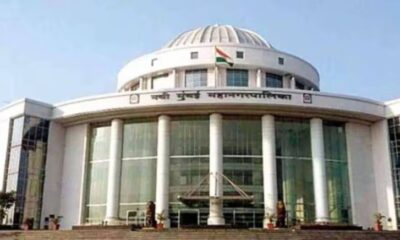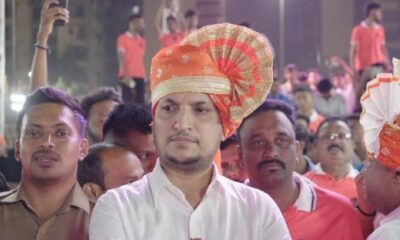Latest News
The Use Of Vashi’s Cycle Tracks Is Hampered By Illegal Parking
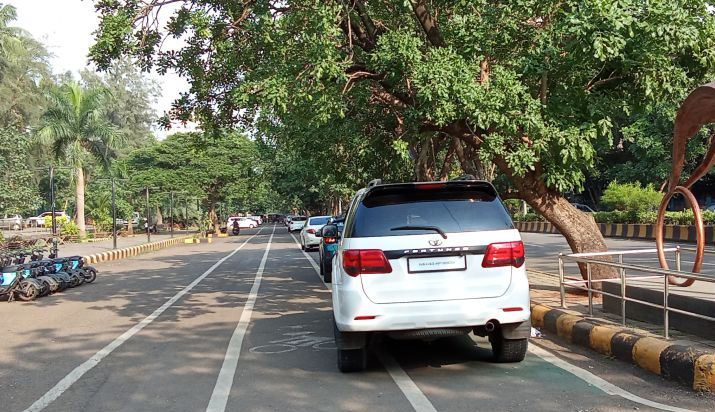
Illegal private car parking has disrupted the cycle tracks of Navi Mumbai.
The Parking
The increasing problem of private vehicles being illegally parked on paths for cycling in the Turbhe-Vashi sector 9 region has shocked and alarmed pedestrians and cyclists. The ongoing encroachment of cycling lanes is a major obstacle, even though Municipal Commissioner Shree Rajesh Narvekar has repeatedly urged residents to use bicycles or public transportation for short distances in order to reduce air pollution.
Following the COVID-19 epidemic, increased health consciousness has led to an increasing focus on physical exercise and leading a healthy lifestyle in metropolitan areas. Thus, in Navi Mumbai, initiatives are being made to bring the idea of a clean, healthy city to life. Dedicated bicycle paths have been created by the Navi Mumbai Municipal Corporation all around the city, including on the service road that passes next to the Vashi depot.
But unlawful parking practices have hampered the planned use of these tracks, which is especially seen during the daily market held next to the canal. Market customers frequently leave their cars parked on bicycle lanes, denying youngsters from the surrounding residential neighbourhoods a secure spot to ride their bicycles.
The problem gets worse by the long lines of cars waiting for gas to fill up at Nerul Sector 6’s CNG pump, which prevents cyclists from using the recently repaved and rebuilt cycle tracks. People have expressed their dissatisfaction by calling on the city officials to act quickly to solve unlawful parking and accusing them for incompetence.
Residents’ fears are heightened by the decline in the state of the cycling tracks, which have patches of damaged asphalt. It is emphasized that remedial actions must be taken immediately to prevent the large sum of money—thousands of rupees—that was spent on building these tracks from being wasted.
Latest News
Navi Mumbai Cancels Invitations to Newly Elected Corporators for Republic Day Ceremonies
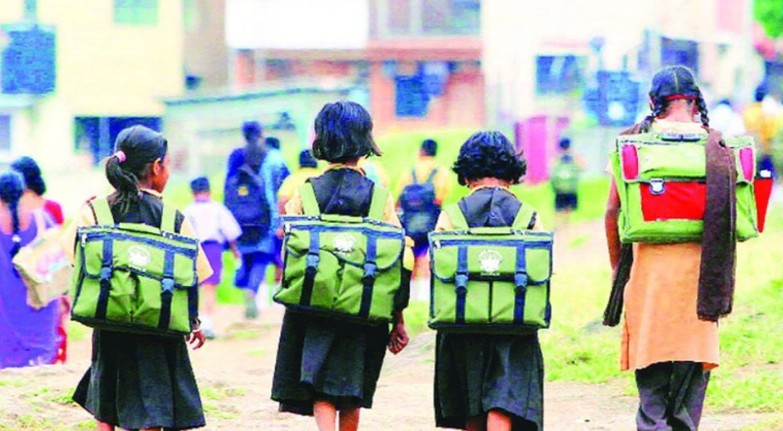
School principals to hoist the national flag following administrative delays.
The Flag Hoisting
The Navi Mumbai Municipal Corporation (NMMC) has cancelled invitations extended to newly elected corporators for Republic Day flag-hoisting ceremonies in civic schools this year, citing administrative and procedural delays.
Although the municipal elections have concluded, the first general body meeting of the newly elected corporators is yet to take place. In view of this, the NMMC education department has issued revised instructions for the January 26 celebrations across all municipal schools. As per the new directive, school principals will themselves conduct the flag-hoisting ceremonies, and corporators will not be invited to preside over the events.
Officials clarified that any earlier circulars or communications instructing schools to invite corporators should be treated as cancelled. In cases where invitation letters have already been sent, school principals have been directed to inform the concerned corporators about the revised decision and explain the administrative reasons behind the change.
The move has been described as a temporary arrangement until formal procedures related to the newly elected body are completed. The education department has emphasized that the decision is purely administrative and not political in nature.
Despite the change, the NMMC has instructed all schools to ensure that Republic Day celebrations are conducted with full enthusiasm, discipline and respect for national values. Principals have been asked to strictly adhere to the guidelines and ensure smooth conduct of the programme.
The decision has drawn attention as it comes soon after the municipal elections, highlighting the impact of procedural delays on official civic events.
Latest News
1111-Feet Tricolor Yatra Fills Navi Mumbai with Patriotic Zeal
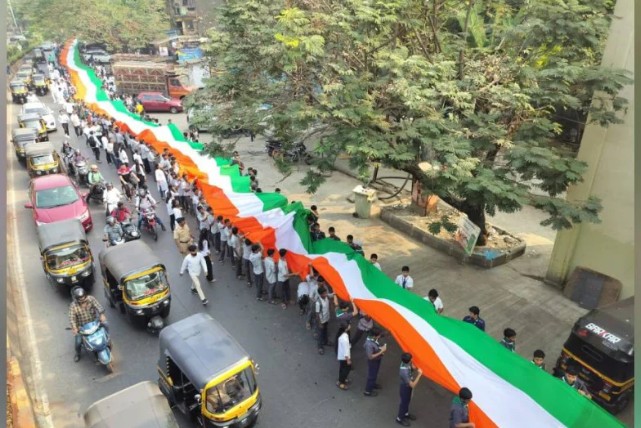
ABVP initiative sees thousands of students participate spontaneously ahead of Republic Day.
The Initiative
Patriotic fervour gripped Navi Mumbai as the Akhil Bharatiya Vidyarthi Parishad (ABVP) organised a massive 1,111-feet-long Tricolor Yatra, witnessing spontaneous participation from thousands of students and citizens on the eve of Republic Day.
The yatra was held as part of Youth Week celebrations and to mark the birth anniversary of Netaji Subhas Chandra Bose, with the objective of inspiring nationalism, unity and social responsibility among the youth. Students marched proudly while holding the enormous national flag, raising slogans such as “Bharat Mata Ki Jai,” “Vande Mataram” and “Jai Hind,” creating an atmosphere charged with patriotic emotion.
The rally began at Blue Diamond Chowk, Vashi, and culminated at Rajiv Gandhi College of Arts, Commerce and Science, Sector 10A, where a short programme was organised. Speakers highlighted the role of students in nation-building and appealed to the youth to actively contribute to society beyond academics.
Prominent attendees included ABVP state minister Rahul Rajoria, sports coordinator Arpita Malik, and college principal Dr Basukinath Pandey, who praised the enthusiasm and discipline shown by the participants. They urged students to uphold constitutional values and remain socially responsible citizens.
The event’s smooth execution was attributed to the efforts of Dr Akshay Shet and more than 100 volunteers. Participants and local residents said the Tricolor Yatra strengthened the sense of unity and national pride, making it a memorable and inspiring pre-Republic Day event for Navi Mumbai.
Latest News
Garbage Piles Become Major Issue Ahead of Uran Elections
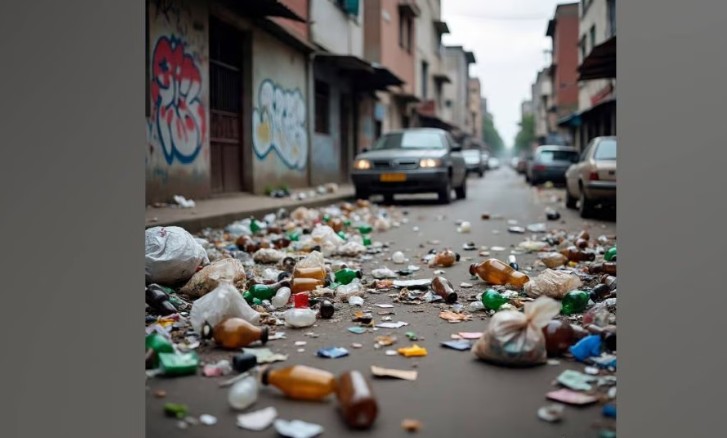
With the Uran civic elections approaching, local residents and political observers are raising serious concerns about the persistent garbage problem across the area. Overflowing waste on main roads and traffic lanes has emerged as a key issue in the election campaign, with voters expressing frustration over poor civic management.
Several key thoroughfares in Uran, especially around busy intersections and residential localities, have been seen strewn with garbage that has not been collected for days. Piles of waste are causing traffic disruptions, foul odour and unhygienic conditions, prompting complaints from commuters, shopkeepers and local residents.
Civic activists and opposition leaders have criticised the local administration for its failure to ensure regular garbage collection and proper waste disposal. They say that poor sanitation has not only affected the appearance of the town but also posed health risks, especially during peak summer months.
Residents pointed out that despite repeated assurances from officials, garbage is frequently left uncollected in several areas, leading to water logging and breeding of insects. Many voters have highlighted this issue as a priority concern affecting their daily lives and have demanded immediate action from authorities.
Political parties contesting the Uran elections have responded by promising stricter monitoring of waste collection, improvement in street cleaning, and deployment of more resources for solid waste management.
As election day approaches, garbage disposal and civic cleanliness have become central themes in public discussions, reflecting growing citizen demand for improved basic services and accountable governance.
-

 Fact Check5 years ago
Fact Check5 years agoNidhi Razdan, fake Harvard professorship, and here is the explanation through her blog.
-

 India4 years ago
India4 years agoAs the arrangement with Prashant Kishor falls through Rahul Gandhi has gone overseas again and is uncontactable
-

 Technology4 years ago
Technology4 years agoBSNL reveals all new 4G plans starting at ₹16
-

 Latest News5 years ago
Latest News5 years agoGovernment has spent ₹9,725 crores on Covid-19 vaccination drive so far
-

 Latest News4 years ago
Latest News4 years agoTata wins Air India with ₹18,000 crore bid
-

 Latest News4 years ago
Latest News4 years agoJharkhand government cuts Petrol price by massive ₹25 a litre but with a catch
-

 Latest News5 years ago
Latest News5 years agoRaj Kundra Gave ₹25 Lakh Bribe to Mumbai Crime Branch to Avoid Arrest
-

 Navi Mumbai5 years ago
Navi Mumbai5 years agoNavi Mumbai civic body raids and tests morning walkers, many found COVID positive







